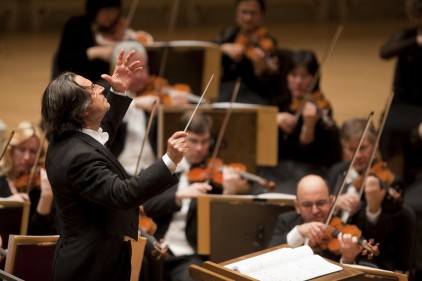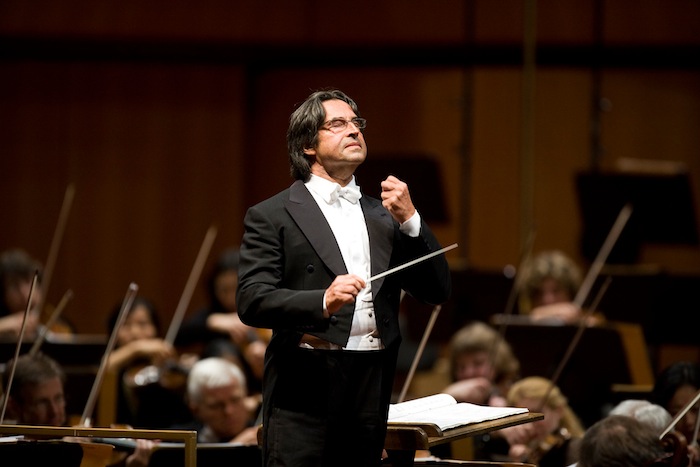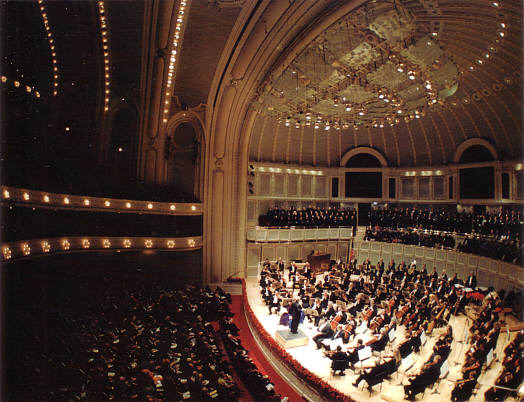The moment for Muti
On Thursday night, Riccardo Muti will ascend the podium at Symphony Center, give the downbeat to Berlioz’s Symphonie fantastique, and launch the Chicago Symphony Orchestra and the city into a new era.
This is one of the rare times when the Brobdingnagian hype and publicity ginned up for an incoming music director are not overstated. The celebrated Neapolitan is one of the most accomplished conductors of our time, and the successful courting campaign of the CSO staff and musicians, led by determined president Deborah Rutter, justly made international headlines. (Particularly when Muti spurned the New York Philharmonic for Chicago.)
The CSO musicians are a tough and opinionated bunch, and getting even a quorum of favorable opinion on most batonsmiths is not easy. But the thoughts and anticipation of the players about Muti’s appointment seem close to unanimous.
“He’s definitely going to provide Chicago with a lot of exciting concerts,” says bassist Roger Cline, who came to the orchestra in 1973. “He’s like Fritz Reiner in that he brings experience in a lot of different styles of music, which he does very well.”
“I’m tremendously happy and excited,” said Melanie Kupchynsky, a CSO violinist since 1989. “He’s held us spellbound in rehearsals with his stories, his humor and his musical examples.”
She says there have been many times when the orchestra has been inspired by conductors, but with Muti, it seems to happen to a much greater degree. “You’re setting the bar higher and higher for yourself and that’s a wonderful thing.”
Jay Friedman has played under four of the CSO’s previous nine music directors and agrees that Muti brings something special to the table that has struck an immediate chord with his colleagues.
“The thing that impressed me most about Riccardo Muti was his single-minded adherence to the score,” said the CSO’s principal trombone. “He is the antithesis of the ‘virtuoso conductor’ who seeks to show his mastery over the orchestra at the expense of the composer.
“[Muti] is a great example of those musicians who follow in the footsteps of Toscanini, where bringing the vision of the composer to life is the only consideration,” he adds. “It’s not the ‘Look at how well I can conduct,’ school of music-making.”
—————————————
With a phalanx of media requests from near and far, getting the opportunity to speak with Muti is an experience akin to sitting on a plane far back in a long line of aircraft on the runway. You hope your turn will come eventually but you’re not quite sure when.
When it does, after a single conversation, you begin to understand—even over the phone–how the Italian maestro’s charisma has mesmerized even the doughtiest skeptics, both in the orchestra and the press.
With the constant clamor and repetition of media requests and questions, informed and otherwise, one would expect some measure of annoyance or at least impatience, but Muti fields each question with grace, candor and unfailing personal courtesy.
Perhaps that’s why the conductor appears to be such a terrific fit for Chicago. There is zero artifice in Muti’s personality and music-making—pointedly demonstrated by his power-washing of decades of interpolated top notes and other inauthentic show-bizzy accretions at La Scala. That straightforward approach, artistic humility and unwavering musical integrity meshes nicely with Chicago’s Midwestern openness and what we like to think of as the city’s can-do spirit and lack of regard for surface frivolities.
Muti believes he is a different person than the driven, ambitious 39-year-old who took the helm of the Philadelphia Orchestra in 1980.
“When I took over the Philadelphia Orchestra, it was my first experience as music director of an American orchestra,” says the maestro from his home in Ravenna. “I didn’t have a lot of experience in the American way of making music or working with American musical institutions.”
“I was young and so I had to–to put it in a vulgar way–make ‘a career.’ Today I have much more experience and I don’t have to make a career. Now I can work with the musicians of the Chicago Symphony Orchestra to make music on the highest level for the people of Chicago. We can concentrate on the spiritual and cultural elements of the music.”
With a repertore spanning from the Baroque to contemporary works, Muti is covering a vast swathe of music in his first season from standard works of Brahms and Beethoven to such rarities as Berlioz’s Lelio opening week, Chavez’s Sinfonia India, Varese’s Arcana and the world premiere of Bernard Rands’ Danza Petrificada, a CSO commission.
But, of course, with the former leader of La Scala, opera will play a part every season. Next spring, Muti will lead a concert performances of Verdi’s Otello, which the same forces will take to Carnegie Hall.
Muti believes the great German and Italian stage works should be as much part and parcel of a symphony musician’s experience as concert works by Brahms and Mahler.
“Opera is not a completely different music,” Muti says. “If you think it is just to accompany singers, that’s all wrong. It’s like a large, enormous quartet. Because there are opportunities for the orchestra musicians in this music as there are for the singers and chorus. When you have to deal with words and a separate dramatic element, musicians become more flexible and more enriched.”
“It’s one thing to know Brahms, Beethoven and Mahler but it’s a different thing to do Bellini, Donizetti, and Mozart.”
Indeed it is that flexibility, openness and facility that are among the qualities that attracted Muti to take this appointment.
“With the Chicago Symphony, you can do everything,” Muti says. “You can explore all types of repertoire. The opportunities are immense.”
He notes that the fabled sonority of the CSO for much of its history can be traced to its German lineage, from founder Theodore Thomas to the crucial 37-year reign of his successor, Frederick Stock.
“The Chicago Symphony has deep German roots,” says Muti, which for years was reflected in its dark, big-bodied sonority and emphasis on a punchy brass sound.
“Before, you would hear about the brass of the CSO, everyone always talked about the brass,” says Muti. “But now, all the musical families are wonderful. The strings have become much more smooth and even Viennese, I would say. When the orchestra played in Italy with me, the reaction of the public was incredible.”
Almost immediately after his arrival in Philadelphia, the conductor started making waves with a call for a new hall to replace the historically revered but antiquated Academy of Music.
While the CSO is not about to depart its home on Michigan Avenue anytime soon, Muti indicated, diplomatically, that the acoustic of Orchestra Hall could stand still more tweaking. The controversial 1997 renovation, by most accounts, significantly diluted the tangibility and transparency of the hall’s high frequencies, something that millions spent in subsequent fixes have only minimally ameliorated.
“I think the hall has a very good acoustic,” Muti said. “Certainly things could be improved. Everything can be improved! If we can make an improvement in the hall so the sound goes out better to the balcony, the parterre and all of the main floor, it’s something to look at.”

Photo: Todd Rosenberg
The Italian maestro’s reportorial bona fides are well known and celebrated in Italian opera and the Austro-German repertoire, yet one of Muti’s most admirable qualities is his continued searching out of offbeat musical byways. Muti performed and recorded–magnificently–a complete set of Scriabin symphonies with the Philadelphia Orchestra, which brought an organic flow and architectural strength to music that many regarded as perfumed piffle.
“I’m sure I will explore new ways,” he said when asked of possible repertoire to come in future seasons. “But I would really like to follow the impressions and experience along with the orchestra and the audience. It would be very boring if I knew what I was doing in five years. The work of a music director is–how do you say it in English–a work in progress.”
Muti has always held a humanistic view of the power of great music to move people, and has lent his musicianship to several humanitarian causes and events for victims of natural disasters. Just a few weeks, he led a “Concert without Borders” in Trieste, with the presidents and musicians from Italy, Croatia, and Slovenia. And he has made bringing music to incarcerated youthful offenders a platform in Chicago.
The spiritual component of music is something that comes up time and again in Muti’s comments in recent years and the emphasis is not by accident. “I’m not a materialistic person,” says the conductor. I believe very much that we are all part of one God.
“I believe whatever we do, whoever we are, we are a part of one universal being that is God. As Brahms said in the German Requiem, we do not die, we are transformed.”
Certainly for many Chicago music fans, Muti’s appointment almost seems like divine providence. For his part, the conductor appears to agree that his coming to Chicago is a case of the right music director with the right orchestra at the right time.
“After several decades, I hope I have developed as a musician and as a person. I have the same energy and the same enthusiasm as before. But I have different attitudes about experiences and life.
“I hope that the audience after every concert has received something good from us. Today’s world is too focused on superficial things—everything has to be exciting, everything has to be glamorous.
“I think it’s more important that the audiences take something home from the music. Something that stays with them.”
Riccardo Muti will open the Chicago Symphony Orchestra’s season 8 p.m. Thursday night with Berlioz’s Symphonie fantastique and Lelio. Gerard Depardieu, narrator; Mario Zeffiri tenor; Kyle Ketelsen, bass; CSO Chorus. cso.org; 312-294-3000.

